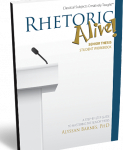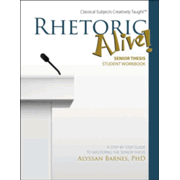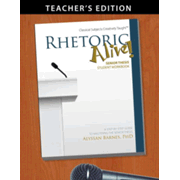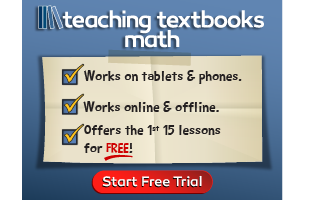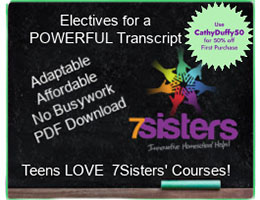With classical education on the rise, more high school seniors are required to submit a written senior thesis, present a senior thesis speech, or do both. A senior thesis or speech is most often required in classical schools, but other types of schools might also require one. Whether or not it's required, the process of writing and presenting a senior thesis is so valuable that I would encourage all homeschooling students to consider doing this. Rhetoric Alive! Senior Thesis Student Workbook can help them through the process whether they are working through a group class or studying independently—and whether or not they are using a classical approach to education for their other coursework. The course consists of the student workbook and a teacher’s edition of the student workbook.
Rhetoric Alive! Senior Thesis Student Workbook uses the vocabulary of classical rhetoric, and it includes brief instruction on rhetoric. For example, the second chapter teaches about the three types of rhetoric—judicial, epideictic, and deliberative—and shows how all three will probably be used in the student's thesis. Although a rhetoric course is not a prerequisite before using the Rhetoric Alive! Senior Thesis Student Workbook, the workbook should serve particularly well for students who have studied rhetoric either with Rhetoric Alive! by the same author or another rhetoric course.
This course guides students through the creation and presentation of both the written and oral versions of their thesis by breaking the processes down into manageable steps. The course groups chapters into five units that are called canons:
- Invention - Discovering Good Ideas
- Organization - Arranging the Argument
- Style - Choosing Words Carefully
- Memory - Remembering What’s Valuable
- Delivery - Presenting the Whole
As you can see, these canons cover the things you would expect—planning, organization, and presentation. But they also teach extra skills you might not expect. For instance, Chapter 14 in the canon on organization teaches students to add mental breaks for their audience so that they are not overwhelmed by too much information without time to absorb it. Also, the fourth canon, which teaches about memory, gives students four different strategies they might use for making an oral presentation, each relying on memorization to a different degree. In addition, Chapter 5 tells students to find a mentor, someone with knowledge regarding the student’s thesis topic. Students should meet with their mentor at least twice. Mentors can help students as they sort through information on their topic to better evaluate sources and ideas. They can also provide knowledgeable feedback as students are close to their final presentations. This chapter covers everything from recruiting a mentor through writing a thank-you note at the end.
While there is only one chapter in the fourth canon on memory, other canons have up to eight chapters. There are 21 chapters in the course, but individual chapters vary in the amount of time required.
The most common chapter format is instructional information followed by a workshop and a presentation. Workshops give students opportunities to practice skills they are learning, and most presentations are opportunities for students to practice oral presentations. Some chapters have other activities called assignments and research.
Chapter 21, “Be Ready for Thesis Day,” consists of advice for students rather than regular lesson material. At the end of the course, a three-page epilogue walks students through a self- reflection on the entire thesis process.
The course has students write their paper first then adapt the language and style of presentation for the oral presentation. They don’t just memorize their thesis paper or read it aloud as originally written. This process helps students learn the differing natures of written and oral presentations, even when both are in a formal academic setting.
A suggested schedule at the back of the book shows the course takes about 30 weeks plus additional time for oral presentations. Students preparing both a written thesis and a speech should complete the entire book in the order it is presented. Those who will present only a written thesis need to complete only chapters one through fifteen. Those preparing only an oral presentation will begin with a section of Chapter 16 then go back and complete all of the other lessons in order. Rhetoric Alive! Senior Thesis Student Workbook should provide a half credit in language arts.
This course needs to be overseen by a parent or teacher, and students will probably benefit most if they can participate in a group class that meets once a week for presentations and discussion. If that’s not possible, a student working independently can do presentations for a parent or teacher. An appendix provides lists of requirements, rubric forms for both the supervisor and peers to evaluate the presentations up through a dress rehearsal for the final presentation—there's no rubric for the final presentation.
Throughout the book, course author, Dr. Alyssan Barnes, provides examples and practical suggestions from her years of experience. Because of this, even parents or teachers without experience supervising senior thesis papers or presentations should be able to successfully guide students through the process. Even if there is no faculty panel to evaluate the final thesis presentations, it’s still well worth doing.

